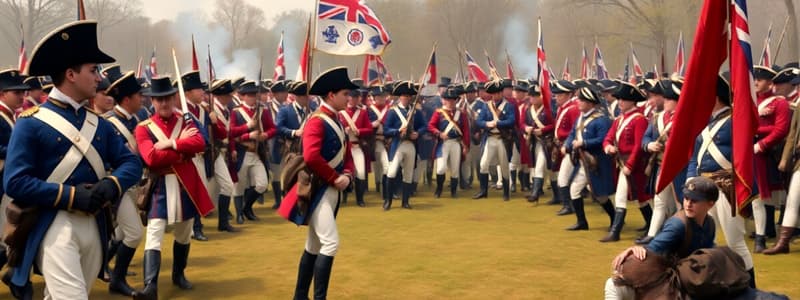Podcast
Questions and Answers
What immediate action did the troops take after being fired upon?
What immediate action did the troops take after being fired upon?
- They set up defensive positions in the area.
- They advanced into the town and retaliated. (correct)
- They retreated immediately to their bases.
- They sought to negotiate a truce.
Which items were destroyed by the troops in their rampage?
Which items were destroyed by the troops in their rampage?
- Senatehouse, military arsenals, and weaponry. (correct)
- Only government buildings and houses.
- Military supplies and personal belongings of civilians.
- The homes of high-ranking officials only.
What method was used to destroy the cannons?
What method was used to destroy the cannons?
- They were crushed under heavy machinery.
- One cannon was used to fire upon the others. (correct)
- They were buried in the ground to prevent use.
- They were melted down in a furnace.
What occurred as a result of the powder magazines being set on fire?
What occurred as a result of the powder magazines being set on fire?
How did the general populace within the army react to the shooting?
How did the general populace within the army react to the shooting?
What was the primary objective of the British forces during their advance towards Washington, D.C.?
What was the primary objective of the British forces during their advance towards Washington, D.C.?
How does the author justify the British actions in Washington?
How does the author justify the British actions in Washington?
What reason did General Ross have for not immediately entering Washington, D.C.?
What reason did General Ross have for not immediately entering Washington, D.C.?
In the context of the passage, which of the following best describes the perspective of the British army?
In the context of the passage, which of the following best describes the perspective of the British army?
What potential consequence was the British army aware of if the Americans rejected their terms?
What potential consequence was the British army aware of if the Americans rejected their terms?
What action was taken concerning government property during the events described?
What action was taken concerning government property during the events described?
How did the British troops conduct themselves regarding private property?
How did the British troops conduct themselves regarding private property?
What was the general atmosphere as the army advanced towards Washington?
What was the general atmosphere as the army advanced towards Washington?
What phenomenon disrupted the troops' bivouac during the night?
What phenomenon disrupted the troops' bivouac during the night?
What unfortunate event occurred shortly before the army began its march towards Washington?
What unfortunate event occurred shortly before the army began its march towards Washington?
Which visual aspect was noted as striking as the troops advanced?
Which visual aspect was noted as striking as the troops advanced?
How were the regiments affected while preparing to move following the battle?
How were the regiments affected while preparing to move following the battle?
What was the soldiers' initial reaction to the bivouac conditions?
What was the soldiers' initial reaction to the bivouac conditions?
Which building is specifically mentioned as being burned?
Which building is specifically mentioned as being burned?
What emotional tone is conveyed regarding the actions taken by the British troops?
What emotional tone is conveyed regarding the actions taken by the British troops?
Flashcards are hidden until you start studying
Study Notes
The Burning of Washington: A British Perspective
- General Ross's troops marched to Washington, D.C. aiming to levy a contribution rather than occupy the city permanently, in accordance with the practices of war at the time.
- This involved the expectation that the Americans would pay in lieu of the conquerors taking public property as spoils, thereby allowing the army to move on.
- The British troops were met with hostility by the Americans who fired on a flag of truce attempting to negotiate.
- This sparked outrage and the subsequent burning, destruction, and looting of Washington, D.C., with the American troops being driven from the city.
- This destruction targeted government facilities, including the Senate House, the President’s Mansion (future White House), and a sizable dockyard with an arsenal.
- In addition, military supplies including cannon, ammunition, and firearms were set on fire or disabled.
- The British destroyed not only government property but also burned a library, print offices, and the archives, sparking debate and condemnation for unwarranted excess.
- The extent of the destruction has been a subject of debate with some lauding the British troops' restraint in sparing private property.
- While the troops were actively destroying the city, the citizens of Washington, D.C., fled in terror and confusion.
- The chaotic escape culminated in the President, James Madison, escaping, and ordering the destruction of a bridge over the Potomac River to prevent further pursuit.
- This left those who remained in the city facing the victor’s mercy.
- The account concludes with the British soldiers enjoying a lavish meal prepared for the American officers in the abandoned house of President Madison, before torching it.
- This demonstrates the contrasting experiences of the victors and the defeated in the war.
Studying That Suits You
Use AI to generate personalized quizzes and flashcards to suit your learning preferences.




